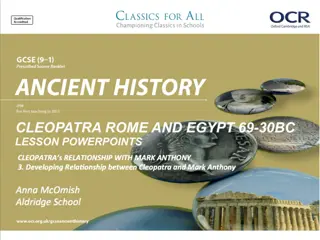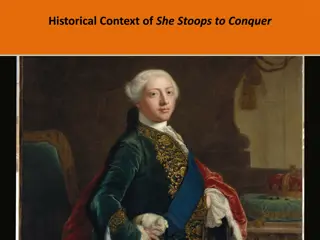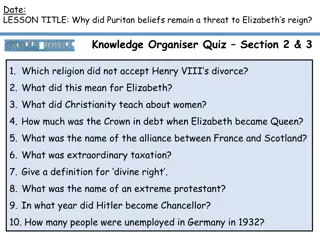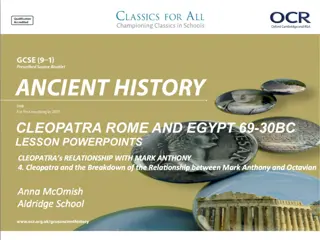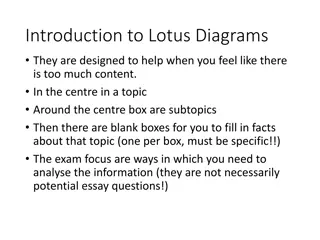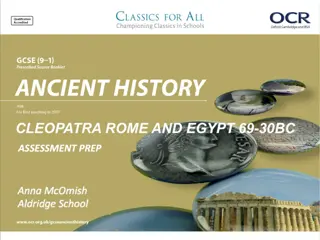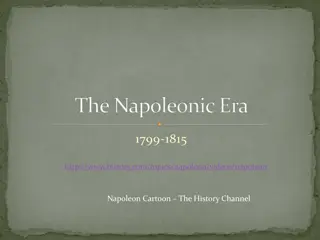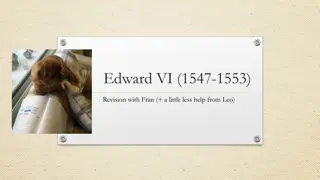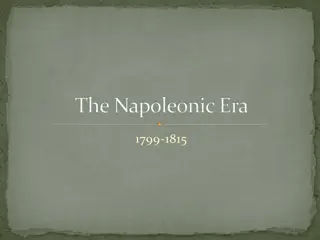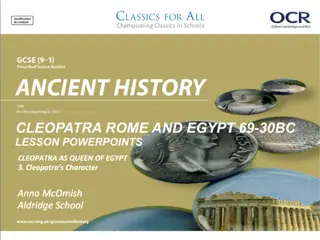Cleopatra's Response to Challenges in Reign
Cleopatra navigated famine, wielded charm, and faced familial strife. Discover her patron deity, intricate relationships, and ties to Rome amid political turmoil. Unravel the enigmatic character of Cleopatra through historical events and conquests.
Download Presentation

Please find below an Image/Link to download the presentation.
The content on the website is provided AS IS for your information and personal use only. It may not be sold, licensed, or shared on other websites without obtaining consent from the author.If you encounter any issues during the download, it is possible that the publisher has removed the file from their server.
You are allowed to download the files provided on this website for personal or commercial use, subject to the condition that they are used lawfully. All files are the property of their respective owners.
The content on the website is provided AS IS for your information and personal use only. It may not be sold, licensed, or shared on other websites without obtaining consent from the author.
E N D
Presentation Transcript
How did Cleopatra respond to famine during the early years of her reign? Describe two examples of Cleopatra s charm. Why did Cleopatra have such a negative relations hip with her sister? What is the biggest challenge when trying to discuss Cleopatra s character? Who was Cleopatra s patron Goddess, and why? Which, superior, ethnic group did the Ptolemies associate themselves with? A b How did Auletes nearly bankrupt Egypt when he was King? How did the Client- State system benefit Rome? Name two of Cleopat ra s four siblings. Describe one Egyptian, and one Hellenistic, presentati on of Cleopatra. Get from A to B by leap frogging from one triangle to the next and answering each question. RULES: you can move up/down, diagonally or in a straight line, (any triangle that touches) but you cannot skip a triangle!
19 April 2025 Civil War between Cleopatra and Ptolemy XIII, 48-47BC (Underline date and title using a pencil and ruler) Lesson Objectives: 1. To understand the events surrounding the civil war. 2. To analyse the impact of the death of Pompey the Great. Key words/Spellings: Cleopatra, significance, client state, resources
The death of Pompey the Great TASK: using the information on p.171, create a 5-step flow chart explaining the death of Pompey and the fallout from the murder. READ Plutarch, Life of Caesar, 48 (p.6) and annotate your flow chart with at least 2 quotes to demonstrate events. In 48BC, Ptolemy XIII and his advisors had successfully driven Cleopatra out of Alexandria/ Egypt. Cleopatra knew that she could still win the throne but she would have to quickly gather troop, so she travelled (we think) to Ascalon in Palestine where it seems she was well-received and raised an army. Cleopatra returned to Egypt in 48BC, with an army large enough to challenge Ptolemy XIII, and Ptolemy sent his general, Achillas, to meet her forces. While this civil war was building, the Roman civil war was also happening between Julius Caesar and Pompey the Great. Pompey was on the verge of defeat, and headed to Egypt for support. This concerned Ptolemy and Achillas, as Pompey had supported their father, Auletes, when he had struggled to control the throne. Upon arrival in Egypt, Pompey met his end. It was decided by Ptolemy and his advisors that Caesar was the better ally to have CHALLENGE How did the actions of Ptolemy XIII push Caesar and Cleopatra closer together. How significant was Caesar in levelling the playing field between Cleopatra and Ptolemy XIII?
Exam Practise 5 markers What can we tell / How accurate What can we learn from the passage about the role of Caesar in the civil war between Ptolemy XII and Cleopatra VII?. (5) 2-3 points, 2 quotes, brief summaries. One/ two paragraphs. Completed in 5mins! Arriving at Alexandria just after Pompey s death, Caesar turned away in horror when Theodotus showed him Pompey s head, but he accepted Pompey s seal-ring and he cried when he saw it. Also, he was kind to all the friends and associates of Pompey who had been captured by the King of Egypt as they wandered about the country and he got them onto his side... As for the war in Egypt, some people say that Using details from the passage, evaluate how accurate you think Plutarch s description of Caesar s role in affairs is. (5) CHEAT SHEET! What do you know of the author s aims/methods/ attitudes How might these impact on the accuracy of this particular passage. What s it saying! it was not necessary but that Caesar did it because of his love for Cleopatra, and that it was not glorious for him but very dangerous. Other people blame the King of Egypt s assistants for it, and especially the eunuch Potheinus, who had the most influence at court, and had recently killed Pompey; he had also driven Cleopatra out of the country and was now secretly plotting against Caesar. People say that because of this, from then on, Caesar spent whole nights at drinking parties to protect himself. Plutarch, Life of Caesar, 48
Arriving at Alexandria just after Pompeys death, Arriving at Alexandria just after Pompey s death, Caesar turned away in horror when Theodotus Caesar turned away in horror when Theodotus showed him Pompey s head, but he accepted showed him Pompey s head, but he accepted Pompey s seal-ring and he cried when he saw it. Pompey s seal-ring and he cried when he saw it. Also, he was kind to all the friends and associates Also, he was kind to all the friends and associates of Pompey who had been captured by the King of of Pompey who had been captured by the King of Egypt as they wandered about the country and he Egypt as they wandered about the country and he got them onto his side... As for the war in Egypt, got them onto his side... As for the war in Egypt, some people say that it was not necessary but some people say that it was not necessary but that Caesar did it because of his love for that Caesar did it because of his love for Cleopatra, and that it was not glorious for him but Cleopatra, and that it was not glorious for him but very dangerous. Other people blame the King of very dangerous. Other people blame the King of Egypt s assistants for it, and especially the eunuch Egypt s assistants for it, and especially the eunuch Potheinus, who had the most influence at court, Potheinus, who had the most influence at court, and had recently killed Pompey; he had also and had recently killed Pompey; he had also driven Cleopatra out of the country and was now driven Cleopatra out of the country and was now secretly plotting against Caesar. People say that secretly plotting against Caesar. People say that because of this, from then on, Caesar spent whole because of this, from then on, Caesar spent whole nights at drinking parties to protect himself. nights at drinking parties to protect himself. Plutarch, Life of Caesar, 48 Plutarch, Life of Caesar, 48



